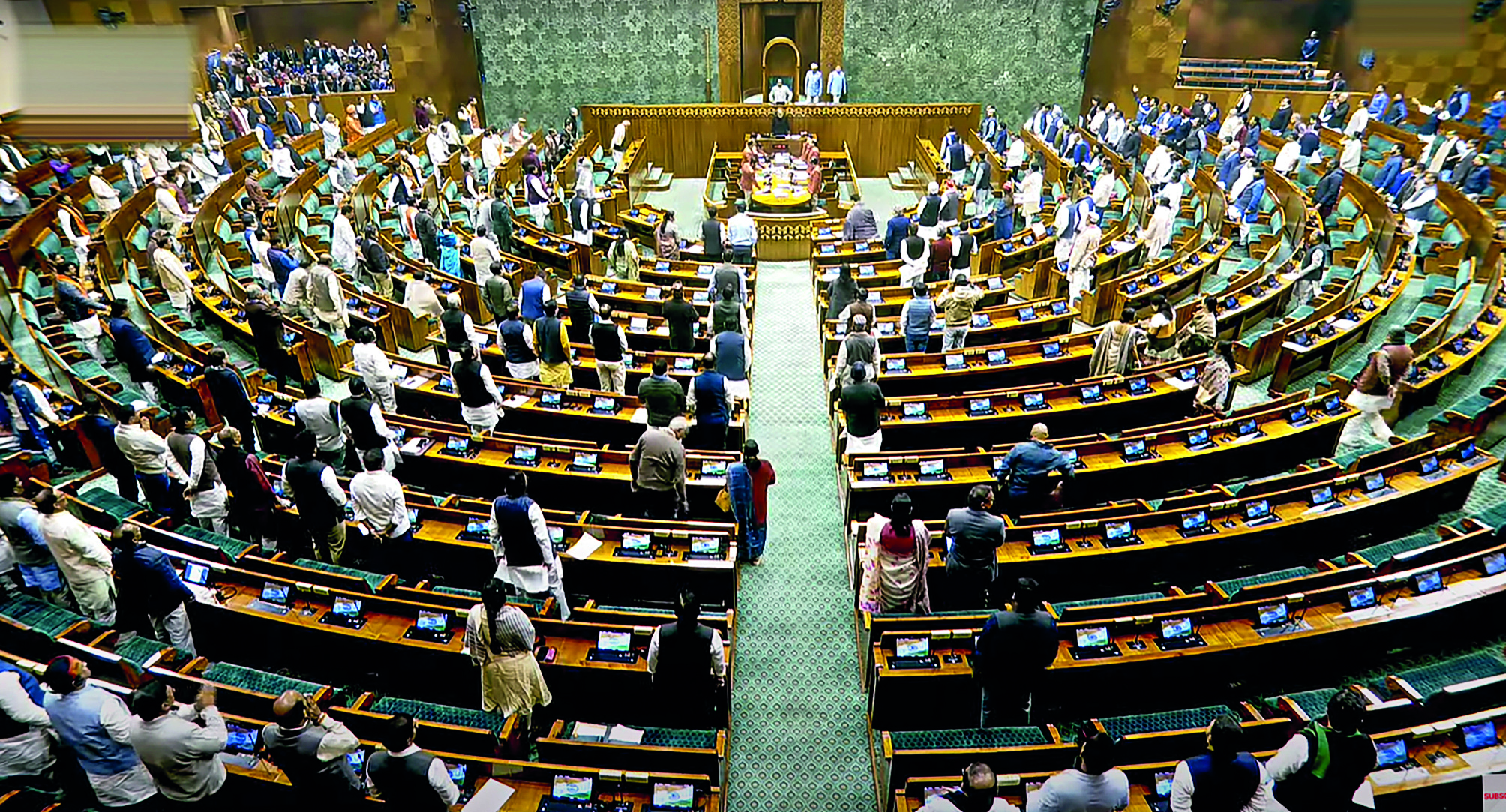Parliament’s Winter Session concludes with political strife and alarming low productivity

NEW DELHI: Shortly after reconvening, both Houses of Parliament were adjourned sine die on Friday, the final day of the Winter Session, amid a standoff between the opposition and treasury benches over the alleged insult to B R Ambedkar and a scuffle on the Parliament premises on Thursday.
The Lok Sabha adopted a resolution referring the bills on simultaneous elections, also known as One Nation, One Election, to a joint parliamentary committee amid uproar. Rajya Sabha BJP members Ghanshyam Tiwari, Bhubaneshwar Kalita, K. Laxman, and Kavita Patidar were to be part of the parliamentary panel on simultaneous polls.
Unprecedented and disturbing scenes between the lawmakers were witnessed on Thursday, resulting in an FIR against Leader of the Opposition Rahul Gandhi and injuries to two BJP MPs. The dramatic scenes of pushing, jostling, and roughing-up broke out after the opposition began protests against Union Home Minister Amit Shah, whom they alleged insulted Dr B R Ambedkar during his speech in the Rajya Sabha.
As both protesting sides clashed on the Parliament premises, the BJP claimed that two of its MPs – Pratap Sarangi and Mukesh Rajput – were allegedly pushed by the Leader of the Opposition in the Lok Sabha, Rahul Gandhi, and sustained injuries.
Lok Sabha Speaker Om Birla on Thursday issued strict instructions that no political party, MP, or groups of MPs would be allowed to hold any dharna or demonstration at the gates of Parliament House.
As Parliament met on the last day of the Winter Session, the overhang of mutual bitterness involving the ruling BJP-led NDA and opposition parties following Thursday’s spat continued, prompting Speaker Om Birla to adjourn the Lok Sabha within three minutes without even the customary summing up of the session’s highlights.
In the Rajya Sabha, opposition parties, which had been protesting against Home Minister Amit Shah’s alleged insulting comments about Dr Ambedkar, agreed to let Chairman Jagdeep Dhankhar read out his valedictory remarks before adjourning the House sine die.
The Lok Sabha’s productivity was nearly 58 per cent, according to its secretariat, much lower than the days when it hovered around 100 per cent.
In his concluding remarks, Dhankhar called upon parties to rise above political differences and restore the sanctity of parliamentary discourse, striking a note of balance amid the opposition’s charge that he had often been partisan.
He said the House effectively functioned for just 43 hours and 27 minutes, with a productivity of merely 40.03 per cent during the Winter Session that began on November 25.
At a press conference, Parliamentary Affairs Minister Kiren Rijiju laid the blame on the Opposition, especially the Congress, saying their continuous protest despite an earlier agreement to allow Parliament to run was the principal reason behind the low productivity.
He said all parties must reflect on what is a matter of great concern, adding that as the minister in charge of parliamentary affairs, he would continue to reach out to opposition leaders.
During the session, five Bills were introduced in the Lok Sabha, four of which were passed. The Rajya Sabha passed three Bills. A special session was also held in the ‘Samvidhan Sadan’ to commemorate Constitution Day on November 26.
If Thursday’s incident marked a new low in the Winter Session, a spirited discussion on the “Glorious Journey of 75 Years of the Constitution of India” for two days in each House was a redeeming feature in a knowledgeable parliamentary debate.
Prime Minister Narendra Modi’s sharp denunciation of the Congress, especially the Nehru-Gandhi family, for its “mutilation” of constitutional values was heard by opposition benches in the Lok Sabha without any serious disruption, as was Home Minister Amit Shah’s reply to the debate in the Rajya Sabha.
Congress leader Jairam Ramesh said his party’s performance in Parliament was “100 per cent” as it raised all relevant issues, including the charges in the US against the Adani group, but the government ran away from debate.
Incidentally, it was the government’s readiness to hold a discussion on the Constitution that had broken the early deadlock in Parliament, as the Congress stuck to its demand for a debate on the Adani row.
While the opposition INDIA bloc was divided, with parties like the Samajwadi Party and Trinamool Congress not agreeing with the primacy given to the Adani issue by the Congress, they rallied together over Shah’s comments.
The highlight of the session’s legislative agenda was two landmark Bills – the Constitution (One Hundred and Twenty-Ninth) Amendment Bill and the Union Territories Laws (Amendment) Bill – to give effect to the mechanism of simultaneous elections to the Lok Sabha and assemblies.
The bills were introduced in the Lok Sabha on December 17 and referred to a 39-member Joint Committee of Parliament on Thursday.
Signalling the deepening divide among different stakeholders in Parliament, opposition parties submitted a notice to move a motion of no-confidence against Dhankhar, but it was dismissed by Rajya Sabha Deputy Chairman Harivansh, who slammed it as an act of impropriety, severely flawed and drawn in haste to mar the Chairperson’s reputation.
Overall, the session provided 20 sittings of the Lok Sabha and 19 sittings of the Rajya Sabha spread over 26 days.



